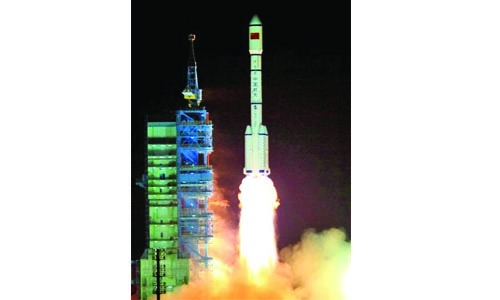Tiangong 1 to provide ‘splendid’ show: China
Beijing : A defunct space laboratory that will plunge back to Earth in the coming days is unlikely to cause any damage, Chinese authorities say, but will offer instead a “splendid” show akin to a meteor shower.
China’s space agency said Thursday that the roughly eight-tonne Tiangong-1 will re-enter the atmosphere some time between Saturday and Monday. The European Space Agency has a smaller window between midday Saturday and early Sunday afternoon GMT time.
But there is “no need for people to worry”, the China Manned Space Engineering Office (CMSEO) said on its WeChat social media account.
Such falling spacecraft do “not crash into the Earth fiercely like in sci-fi movies, but turn into a splendid (meteor shower) and move across the beautiful starry sky as they race towards the Earth”, it said.
The lab was placed in orbit in September 2011 and had been slated for a controlled re-entry, but it ceased functioning in March 2016 and space enthusiasts have been bracing for its fiery return.
The ESA said the lab will make an “uncontrolled re-entry” as ground teams are no longer able to fire its engines or thrusters, though a Chinese spaceflight engineer denied earlier this year that it was out of control.
China sent another lab into orbit, the Tiangong-2, in September 2016 and hopes to turn it into a crewed space station by 2022.
Experts have downplayed any concerns about the Tiangong-1 causing any damage when it hurtles back to Earth, with the ESA noting that nearly 6,000 uncontrolled re-entries of large objects have occurred over the past 60 years without harming anyone.
The CMSEO said the probability of someone being hit by a meteorite of more than 200 grammes is one in 700 million.
- ‘Spectacular show’ -
During the uncontrolled re-entry, atmospheric drag will rip away solar arrays, antennas and other external components at an altitude of around 100 kilometres (60 miles), according to the Chinese space office.
The intensifying heat and friction will cause the main structure to burn or blow up, and it should disintegrate at an altitude of around 80 kilometres, it said.
Most fragments will dissipate in the air and a small amount of debris will fall relatively slowly before landing, most likely in the ocean, which covers more than 70 percent of the Earth’s surface.
Related Posts

